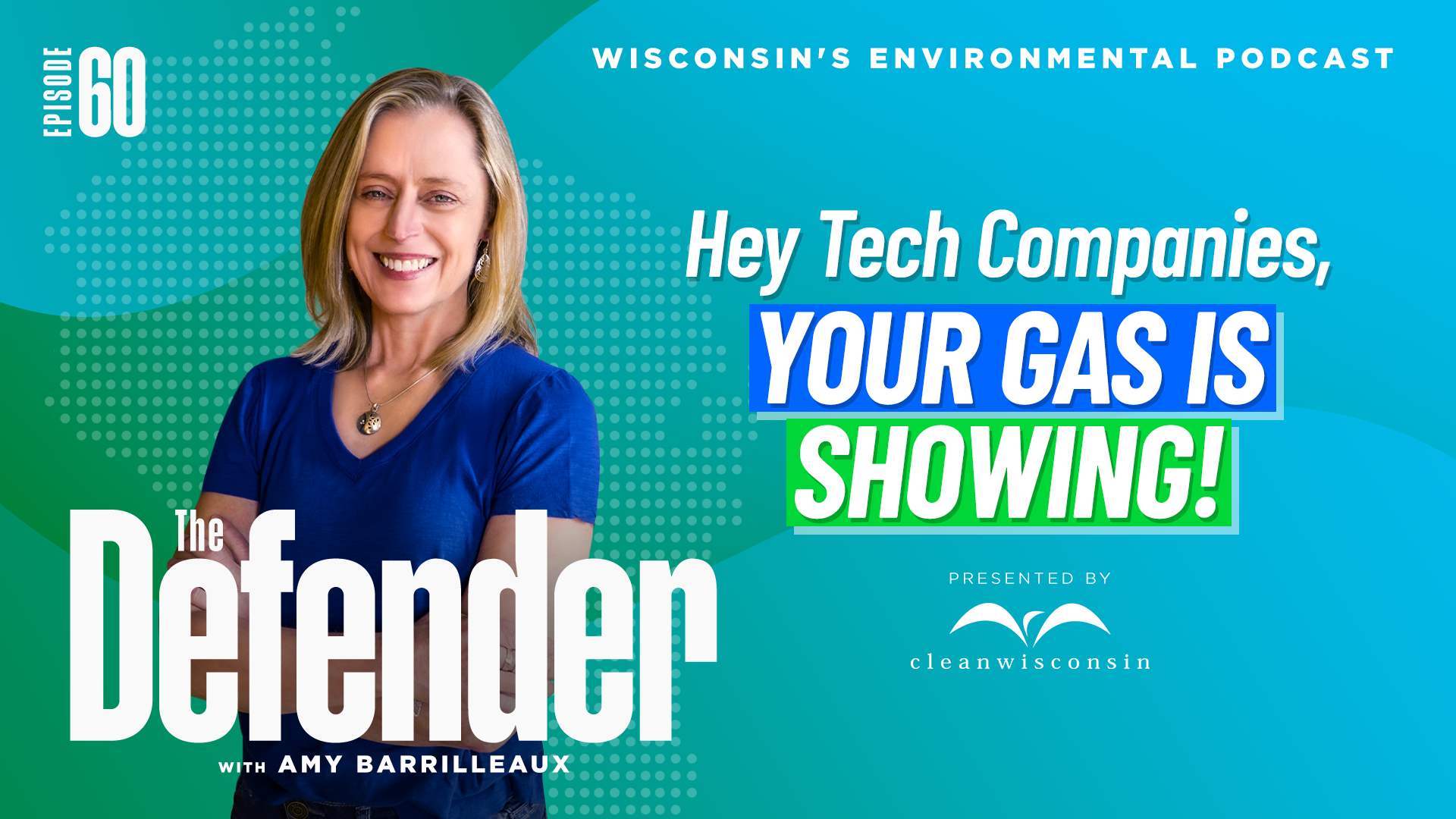Where to Listen:
Don’t look at the gas plant behind the curtain! If you feel like tech companies and energy utilities are gaslighting you with their assurances that AI data centers won’t hurt our environment, you’re probably right.
In this episode, how AI is causing a fossil fuel boom in Wisconsin and the lawsuit just filed to try and stop it.
Host:
Amy Barrilleaux
Guest:
Katie Nekola, General Counsel, Clean Wisconsin
Ciaran Gallagher, PhD, Energy & Air Manager, Clean Wisconsin
Resources for You:
Petition: Take A Stand Against Unchecked Data Center Development
New Analysis: Data Center Water Consumption Will Be Far Higher Than Tech Companies Claim
PSC approves plan to power AI data center with gas plants
Transcript:
Amy Hi there and welcome to the Defender, Wisconsin’s environmental podcast. I’m Amy Barrilleaux. The Defender is powered by Clean Wisconsin, your environmental voice since 1970. I did not intend to do yet another AI data center podcast this week, but these projects are coming at Wisconsin so fast and with such profound implications for our environment that it’s hard to stop talking about them. And if you feel like tech companies and energy utilities are gaslighting you with their reassurances that we don’t have anything to worry about, you might be right. Case in point, We Energies’ insistence that they’ll meet virtually all of the Port Washington data center needs with clean, wind, solar, and battery storage.
Ciaran They have a lot of coal and they have a lot of gas on their system. So to me, the math just doesn’t add up that these data centers are gonna be met with renewable energy unless it means that the rest of their load is being served by dirty fossil fuels.
Amy In this episode, how AI is causing a fossil fuel boom in Wisconsin and the lawsuit just filed to try to stop it. That’s right now on the defendant. MISO and FERC may sound like the heartwarming new show about a detective and his faithful dog coming this fall to Hulu, but no, they are actually two organizations with big control over energy: the Federal Energy Regulatory Commission, or FERC, and the Mid-Continent Independent System Operator, or MISO, that operates our power grid. MISO and FERC are at the center of a new lawsuit because they are tilting the scales in favor of fossil fuels. Right now, Clean Wisconsin is suing the Federal Energy Regulatory Commission over its approval of new energy grid rules that allow power companies to fast-track gas-burning power plants. Gas plants are now jumping line to be added to our energy grid ahead of cheaper, cleaner, wind, and solar. Wisconsin is already seeing four new gas plant proposals under the new rules, including a very large 1.2 gigawatt gas plant in Kenosha County. And maybe no surprise, what’s powering this gas boom in Wisconsin? AI and its tremendous need for power. Joining me is Clean Wisconsin attorney Katie Nekola and Energy and Air Manager Ciaran Gallagher. Thank you so much for being here.
Katie Thanks for having us.
Ciaran Yes, thank you.
Amy So I think we’re gonna delve into some issues that are kind of complicated but important. So I wanna start first with this decision, this plan from our grid operator, MISO, to kind of tilt the scales in favor of fossil fuels, to be able to fast track gas burning power plants in what has been characterized as an emergency. So first we should del delve into a little bit, is there an emergency, an energy emergency happening right now?
Ciaran We need to get energy resources online as fast as possible, which has been the case for the last few years. And the grid operator, MISO, has a slow, slow, slow process to get resources like wind, solar, and batteries onto the grid. And what should be less than a year long process is now turning into five years. And so these projects are waiting and ready to get onto the grid, but they’re just stuck in this endless queue as MISO studies them, projects drop out, they have to be restudied. So this this normal process is not working as it should. That’s more of the emergency. And instead of fixing that process, the grid operator has said, let’s do a different process, but only for certain resources. There are constraints on on who can qualify. And it is not explicit that this process is for fossil fuels, but we can see that the end result has led to favoring of gas plants in this process.
Amy Utilities might say, because I’ve heard them say, well, gas plants are really the only way that we can quickly meet energy needs. That we need these gas plants for those days when, you know, the sun isn’t shining, the wind isn’t blowing. I mean, I’ve heard that talking point from numerous utilities in Wisconsin and in Minnesota. So Katie, you know, is that true? Is it well, wind and solar sound great, but what we need in times when we need energy fast, we need gas.
Katie I don’t know when they’re gonna give up that tired old talking point because it’s it hasn’t been true for a long time. There’s been a widespread deployment of solar and wind energy and there’s more and more battery storage and you know, it’s not a matter it’s a big grid. And so the sun is always shining somewhere and the wind is always blowing somewhere, and so it’s it’s it’s just a very tired talking point. It’s not true.
Amy So then why tilt the process in favor of fossil fuels then? Why not tilt it in favor of something cheaper like wind and solar?
Ciaran Goes back to the fact that wind and solar and batteries are newer technologies. They are different technologies that utilities and and the grid operator have to grapple with some of the the unique considerations. And I think gas is just the easy answer. They know how to turn turn that on when it gets hot and ACs are running. It’s more complicated to manage a grid that is primarily dominated by renewable energy, but it is possible. And they’re just stuck in their mindset that we need energy that has an on off button. And now there is all this hype around AI data centers demanding to be added to the grid as soon as possible and the only way in their minds they they can conceive to meet that demand as soon as possible is with gas. Some counterpoints are that there are now years long waiting lists to receive some of the parts of a gas turbine because there is such a rush to gas in Wisconsin, the United States and and the globe. And I think this rush to gas is discounting many of the other tools in the toolkit, like load flexibility, demand response on those hottest days of the year when we need the most generation to meet that electricity demand. How about these data centers reduce their computing power for a couple of hours? Let’s let’s think about ways that we don’t need to overbuild our energy grid and burden ratepayers and be let’s be more creative.
Amy Talk about I guess the energy of the future, which we think of as wind and solar energy, clean energy, and the energy of the past, burning fossil fuels, I think you can look at the Town of Paris, which we’ve been talking about a lot lately because first we were talking about the Town of Paris because We Energies in 2024 unveiled the Paris Solar Project with solar panels and battery storage and it was going to be able to provide energy when the sun wasn’t shining, which We Energies is happy to talk about that when they’re talking about that solar project. And now we look at Town of Paris and a new gas peaker plant just approved because of data center demand and potentially a new gigantic gas project in the works as part of this fast track process has not yet been approved. And that’s the future that the Town of Paris is kind of looking at first of all, Katie, Kenosha County is one of those counties in Wisconsin that already has an air pollution problem. So explain to me what’s happening in Kenosha County and how these new gas plants might really be that much more harmful.
Katie Yeah, the American Lung Association gives Kenosha County an F ranking when it comes to air quality and it’s already in non attainment for ozone, which means it doesn’t meet federal standards for its for the ozone levels that it has there. And I think I think we’re seeing in a lot of towns in southeastern Wisconsin that they’re becoming sort of energy infrastructure islands, and I think a lot of people are upset about that. So, you know, because there’s already a lot of infrastructure, it draws more, right? You’ve got the transmission, you’ve got all you know, the substations, you’ve got all of that. And so we’re seeing a lot of development over there. And it’s going to be, you know, increasing costs for everybody who lives there. But in terms of the health impacts, it it also sort of concentrates a lot of the air emissions from gas plants in one part of the state. And it’s, you know, not coincidentally the part of the state that’s already the most polluted. And, you know, if you pair that with the rollbacks on the federal level of all of our, not all of them, but a lot of our air pollution standards and protections, like the Good Neighbor rule, which is intended to protect Wisconsin from upwind states emissions, you know, and just all of the rollbacks of all of that are are gonna have serious health impacts more than people already have in southeastern Wisconsin.
Amy I think what’s interesting also in the town of Paris is that you know you have We Energies saying it’s gonna meet help these tech companies meet their carbon free energy goals, right? It’s gonna meet those data centers’ energy demands with wind and solar and battery storage, which you do have in the Town of Paris, you have solar and battery storage. I guess it’s possible then for We Energies to say, well, hey, Oracle and OpenAI, your data center is gonna get energy from this wonderful solar project. And hey, everybody else, your energy is coming from this gas plant. I mean, is that it’s kind of a shell game, but is that how it could work?
Ciaran Yeah, I do think that’s how it works. I think there has been a lack of transparency from the utilities and from the data centers and but just some big flashy bold statements saying, “Don’t worry, everything’s fine here.” But I think it is up to Clean Wisconsin and other experts to look under the hood and and see how true and then how false those statements are and and who is bearing the burden of these health harms and and this polluted energy that they’re adding to the grid.
Amy So if I’m understanding correctly, basically it’s possible for We Energies to say, hey, this clean energy here, that’s that’s for the data centers. And then everybody else, gas plant. You know, so that the data centers are able to meet their clean energy goals and then maybe the rest of us just get all this new fossil fuel burning stuff that they get built. I mean, is that basically it all goes to the grid, so it’s really basically about what We EnergIes says is happening, not really about reality.
Ciaran Yeah, w once an electron is generated either at a solar plant or a gas plant, you can’t track it to its end source. So it it’s what We Energies’ behind the scenes math is, knowing that their residential customers are gonna need X amount of megawatts over a season or or the the most that they’ll they’ll demand in the summer months versus their the data center customers. And so they’re making those internal judgments themselves. One of the ways that they’re able to do this is because we have no transparent planning process for utilities in Wisconsin. That is something most of our neighbors have and is something that could help increase the transparency on both the utility’s, WE Energies’ long term investment generation plans. And also how are they going to meet these carbon free goals that they do like to talk up and put on their website and to my knowledge are still goals that they hypothetically are going to meet. But I think as the days go by it’s harder and harder to see how they can accomplish m that unless they have a ton of stranded assets come 2050 when their carbon free goal comes around.
Amy When you talk stranded assets, that’s basically things that they built that are really expensive that their ratepayers are paying for that they don’t use anymore. So Katie, you you know, this is all very expensive, right? What is gonna happen in terms of cost, especially when you have a utility that can be like, oh this energy is for this maybe potential customer class and this energy is for a different customer class. I mean it starts to get really complicated really fast.
Katie Well, I think there’s a concern too that if if the renewable energy is dedicated, let’s say, to data centers, that’s really the least cost form of energy and generation that you can build. And so that’s what the data centers would be paying for. I think that it’s unfair to expect all the other ratepayers to pick up the tab for the more expensive kind of generation that they want to build to serve the rest of their customers as well. So I think that’s something to be considered.
Amy And I think there’s we’re seeing some of that playing out in this sort of like PSC tariff process. And then when you start talking about the tariff process, things start to get really complicated really fast. Like it’s it’s hard for people just maybe listening to this podcast to, you know, get a handle on all that. And you know, people have their daily lives to worry about anyway. So but how important is it that we kind of get some kind of a statewide plan together as we see these big huge increases in demand?
Katie I think it’s critically important that we take a a wide lens look at all the data centers coming into Wisconsin and don’t just deal deal with them sort of piecemeal one at a time. The state has to understand what the cumulative impacts are of having to build all this new power generation to serve these data centers. The water use of the data centers. I know that they’re saying that they aren’t gonna use very much water, but we have yet to see exactly what the case is there. I don’t know. And I think that it’s a huge change for our state and it’s it’s gonna bear a huge the customers are gonna bear a huge cost for all of this. You know, the claims about economic development, I just haven’t seen those substantiated either. So how many jobs really will they provide? You know, I know the tax benefits are there, but this all has to be balanced out at the state level, not in individual cases of the public service commission or in individual municip municipalities, which I know are doing their best to handle this influx, but I think this warrants the state of Wisconsin taking a hard look at this.
Amy So back to the MISO our grid operator decision to kind of tip the scales in favor of fossil fuels. Ciaran, what’s your your fear if this is allowed to continue? Like what’s gonna happen in Wisconsin and not just Wisconsin, but there’s the entire MISO service territory, which is quite large. What’s gonna be the result of all that?
Ciaran Our fear is that we’re just gonna build so much gas plants that burden ratepayers that burden nearby communities with harmful air pollution and lock in even more climate change causing pollutants that’ll make the extreme weather and and climate change events like these terrible wildfire air pollution days and and terrible flooding events even worse for our state and and others around the world. Gas plants, methane gas, that is a a climate pollutant that is causes even more near-term warming in the atmosphere than carbon dioxide does. And so there is a a huge health and climate and economic impact from rushing to build all these gas plants and we’re gonna see rates we’re already seeing electricity bills go up and natural gas is has volatile prices. So today it might be a affordable, but in next year, two years they those prices might skyrocket. Whereas we know that once we build a a solar and wind farm, that electricity is going to e each moment of generating electricity once you build it is essentially free. We don’t have to pay for the fuel of the the sun rays or or the wind. And so it’s it’s it’s just devastating on on all aspects of our society, our pocketbooks, our our health bills and and our climate.
Amy When you think about the Town of Paris, and how, you know, there was this ray of hope with this Paris solar project, and the battery storage and this was gonna be the future of energy in Wisconsin and now we’re suddenly seeing it m move backwards again in that same one small town, although this is playing out in a lot of different places. It almost feels like it was pushed back twenty years. I mean, Katie, you’ve been like working on these issues for a while. How does it make you feel when you see the progress that was made even just a few years ago start to be kind of eclipsed by more fossil fuel burning power?
Katie Well, I I feel discouraged, of course, but I also think this points more than ever to the need for the state to take control of its own sort of destiny when it comes to its energy sources and its energy consumption. You know, I think that we need to invest more in efficiency and we need to pay attention to what’s you know, what’s possible to do and not just sort of passively allow all of these heavy energy users to come into the state and say, “Oh, all we can do is is serve their need,” right? Well maybe not. Maybe we can think about this a little bit more proactively and and manage our own resources well. And that’s what Wisconsin has a long tradition of doing. We’re we were a progressive state in that regard. We had the first public service commission anywhere. And you know…
Amy I did not know that!
Katie This is true! You know, and so we we did know how to do this and we can do this again. We just need to have the will to do it.
Ciaran And I think we need some new laws to to enforce it as well. Something that we don’t have that some of our neighbors have are clean electricity standards. They have laws that mandate that their utilities have clean carbon-free power by twenty fifty or or twenty forty. Minnesota, Illinois, Michigan. And I think we are seeing that the utilities response to some of this these data centers are different in those states because they have these protective laws that ensure that the investments utilities are making now shouldn’t be obsolete by the time those laws come into effect in in 2050, and that they have to be making progress in implementing the the cheapest, most affordable, which also happens to be carbon-free, emission-free solar and wind. So I hope that our state leaders can pick up that mantle and decide that they too want Wisconsinites to have a a healthier, clean and more livable state.
Amy When you hear We Energies saying things like, Well, we’re gonna meet the demand of this, you know, more than one gigawatt data center with renewable energy, with wind and solar, battery storage, except on the coldest or hottest days. What should people be reading into that when they hear that? Should they be skeptical of that statement?
Ciaran I think so because We Energies does not have the best track record in investing in solar and wind projects. They have a lot of coal and they have a lot of gas on their system. So to me the math just doesn’t add up that these data centers are gonna be met with renewable energy except on those few days. Unless it means that the rest of their load is being served by dirty fossil fuels. Kind of going back to that shell game we we talked about earlier. We energies can and needs to invest more in these clean energies and also more demand response, more energy efficiency. Let’s talk to data centers about how on those coldest and hottest days maybe they turn their cooling systems up a few degrees. What what how can they be good neighbors without adding to our energy burden in in the state?
Amy I think some data center proponents are saying that, you know, there isn’t gonna be any environmental harm. From these data centers that everything’s gonna be okay. Katie, are you suspicious of that? Or have we already seen maybe some environmental harms happening with the new gas plants that have been approved?
Katie Well, I think it’s unrealistic to think that there would be no environmental harm from something so large that requires so much power. Obviously there will be. You know, these these have a large footprint and they have a large need for water and and electricity. And any time you bring that to the table, that’s gonna have environmental impacts. You know, we we work in the energy s space because of that, and it gets really wonky really fast. And it’s and I I know that that for a lot of people it probably is hard to see the direct connection between environmental, you know, pollution and all of these energy issues that we work on. But the fact is that energy production is one of the most polluting sources that there is, along with cars. And you know, some stuff in the industrial sector. But so we so we do get have to get involved in all of these energy decisions. And I think I forgot your question.
Amy Well, I think you’re getting there. Like, is it realistic to say that these projects aren’t gonna harm the environment? Because you’re right, they are they’re big, they use a lot of energy, and by using a lot of energy they potentially use a lot of water, not just on site, but off site. They have typically backup diesel generators, so there’s a lot going on. But I do think your point about this is a big important environmental fight that’s really wonky and happening in like these tariff dockets and in this lawsuit against In these places where people don’t have not even heard of, let alone you know, are really like, Hey, let’s get involved. So how do people who care get involved or make a difference when what’s happening is in these kind of sort of wonky regulatory spaces.
Katie Well, there it depends on the wonky regulatory space, I think. There are more or less opportunities to get involved. When you’re at the state level, it you can get involved in your public service commissioner, DNR, Department of Natural Resources proceedings for air permits or for for permits to build power plants. That is fairly accessible, I think, to people who want to get involved if they want to make a public comment on some of those issues. And you can look at our website and our the things that Clean Wisconsin and others provide in terms of information about how to how to do that, how to get involved. I think when you get to some of the the federal agencies like FERC and then the regional entity like MISO, it’s a little bit more opaque and and difficult to know how to how to get involved, but maybe Kieran has some ideas about that.
Ciaran Yeah, just on the getting involved in the regulatory proceedings and the air permits, that is a bit of a whack-a-mole. And if a data center or one of these energy plants is coming to your community, that is the right space for you to engage in. But I I think we need to also call on our state lawmakers that we need to pause and make a plan, have a statewide comprehensive plan on how we’re going to approach these these data centers and evaluate the the energy, air quality, water impacts that that these are gonna have on our state and and look under the hood that we’re even the experts are being told, don’t look under this hood, just trust us that there’s something good under here. So I I think that that’s something that any Wisconsinite can do and and I would refer people to our website on on how to sign a petition and and call for such a plan from our state leaders.
Amy We didn’t set out in this discussion to like focus so much on data centers, but it feels like every discussion we have kind of comes back to data centers. But I do want to bring it back more more pointedly to our lawsuit that we’re involved in against FERC. How important Is it that we are part of this lawsuit? It’s not just Clean Wisconsin, it’s other entities. But why Clean Wisconsin?
Katie I think it’s important for Clean Wisconsin to represent the interests of of both its members and just the public in general in Wisconsin in these in these matters because these again are are things that aren’t noticed by most people probably. If I didn’t do this work I wouldn’t notice them. But they are they are critically important because renewable energy is facing some pretty strong headwinds right now from the federal government, which is is not wanting to permit new projects and not wanting to provide the tax incentives that they have in the past. And so to have this this grid operator also being prejudiced against renewable energy just it just presents too many obstacles and it’s ridiculous because you know this is the cleanest, cheapest source of electricity that we have available to us. And here we are putting obstacles, you know, in in its face. So I think I think it’s really important. We’re in this lawsuit with a number of of national environmental organizations, which represent people all over the country. But we represent Wisconsin. And Wisconsin has a particular, you know, perspective and interest in all of these matters and we want to be there to be the voice for those interests.
Amy And we want to be leaders again, like we used to be.
Ciaran And because of we don’t have proper planning in our state, we don’t have a clean electricity standard, some of the largest gas plants that are gonna go through this process are in Wisconsin. There’s one that is going through the first first s cycle to of projects to be studied and that is the one in Paris, Wisconsin that is m massive, 1.2 gigawatts. There is another project in forest junction that’s lower on the list. I don’t know when it will be selected from this list to be drawn up to be studied, but that’s also one point two gigawatts of of new gas in this state. So because we don’t have some of the other laws that other states do, we’re being more affected by this bad process that favors gas at MISO. And so I think that’s why it’s especially important that that we are part of this lawsuit.
Amy Well, I know it’s wonky, but I think it’s fascinating. So thank you both for taking the time to kind of explain all this and talk with me today. I really appreciate it.
Ciaran Thanks for having me.
Katie Thank you.
Amy And thank you for listening to the Defender Podcast. That petition Ciaran mentioned already signed by more than a thousand people across Wisconsin, calling for a pause on data center approvals. You can find a link to that in the show notes or on our website at cleanwisconsin.org. Feel free to sign on. And if you have something you want me to talk about or a comment about the show, send me an email podcast at cleanwisconsin.org. And remember to leave a rating and review on your favorite streaming app. It helps other people find us. I’m Amy Berilleaux. Talk to you later.




